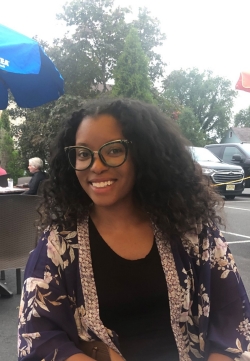Studying and Strategizing to Improve the Health of African American Women

[ad_1]
Expanding her education and her research, graduate student Tierra Smith examines hypertensive medication non-adherence to have a greater impact on this community of women

As Tierra Smith ’21 MSN, CCRN-CSC expands her education, so too is she widening and deepening understanding of medication non-adherence that could aid countless hypertensive African American women in the future.
Smith calls Elkins Park, Pa. home and is a clinical nurse educator at nearby Abington Jefferson Health. In May, she graduated from the Fitzpatrick College of Nursing’s (FCN) master’s program in nursing education. While a student, she began working with Mary Ann Cantrell, PhD, RN, CNE, ANEF FAAN, professor and director of the PhD Program, on an integrative review to identify factors associated with, and predictors of, non-adherence to medication regimens in hypertensive black women and to recommend strategies to enhance adherence among them.
“As an African American woman, I have always been interested in health disparities that disproportionately affect minorities,” explains Smith, “These women are disproportionately affected by cardiac diseases such as hypertension yet are underrepresented in the literature.”
She is completing her literature review utilizing a medication adherence framework to understand factors that affect hypertension medication adherence in African American women and hopes to be done by the end of August. Smith candidly admits she is surprised by how long the deliberate process takes, but making a difference for these patients is her goal.
“I am finding that affecting medication adherence in this population requires a multi-factorial approach that should consider social and discriminatory factors,” she shares. Her goal is to submit a manuscript for publication and continue to research the topic.
Smith’s previous work and education have informed her latest choices. “As a nurse educator, I teach nurses how to care for patients with cardiac disease and an array of other cardiac issues,” she explains. “However, I’m learning that to really affect change, educators must start with prevention. This sparked my desire to return to Villanova Nursing for the Adult-Gerontology Nurse Practitioner post-master’s certificate program.”
This budding researcher plans to then apply for FCN’s PhD program, saying, “I’m excited about what the future has in store.”
[ad_2]
Source link
